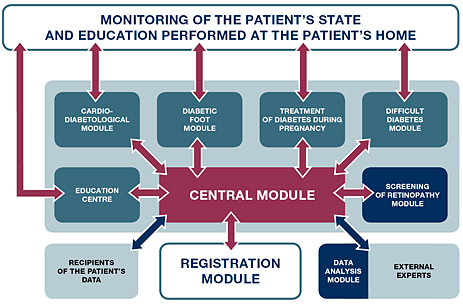Diabetes is one of the most costly diseases from purely human as well as economical point of view. Currently, it is estimated that a total number of diabetic patients around the world is larger than 240 mln and that this number is growing very fast. Up-to-date estimates has shown that in Poland 2.5 mln i.e. 6% of the population suffers from diabetes.
Diabetes is the most common cause of kidney failure, blindness in people in working age, dysfunction of the nervous system and amputations of the lower limbs. It is a main risk factor for the ischemic heart disease, stroke and malformations of newborns.
Diabetes treatment is an extremely difficult and complex problem. The increasing number of diabetic patients, multitude and variety of medical, organizational and social problems require a coordinated and complex therapeutic intervention to be enforced. Currently, a tendency can be observed toward a wide application of an ambulatory treatment that make it possible to avoid expensive hospitalizations. In many countries daily units are organized not only for patients with late complications of diabetes or with unstable metabolic control but also for patients with newly diagnosed type 1 and type 2 diabetes.
The objective of the current project was to design and develop a system called MODEL CENTER OF DIABETES TREATMENT. This MODEL CENTER integrates novel, effective systems aiming at technical support of monitoring and treatment of diabetes, educating the diabetic patients as well as screening for diabetic retinopathy.

Primary structure of the CENTER bases on four specialized modules / clinics, the central educational unit and the screening unit. Particular specialized clinics are devoted to: (1) cardio-diabetological complications, (2) treatment of the Diabetic Foot Syndrome, (3) treatment of diabetes during pregnancy (gestational and type 1 diabetes) and (4) treatment of “difficult diabetes”.
Software of the MODEL CENTER OF DIABETES TREATMENT that was developed can serve as a modern, replicable solution for medical care supported with telematic technique (home and mobile telecare). This should significantly increase quality of medical care elimination a necessity of expensive hospitalization towards more effective and less expensive ambulatory treatment.
Practical aims that should be achieved thanks to implementation of the results of the project are as follow: decreased number and duration of expensive hospitalizations, intensified care in patients with unstable diabetes, application of home telemonitoring and telecare of the Diabetic Foot Syndrome, complex education of diabetic patients with an optional distant reeducation at home (tele-education) and wider application of screening and monitoring of the late complications of diabetes.
MODEL CENTER OF DIABETES TREATMENT bases on a few systems for technical support of diabetes treatment designed and developed in IBBE PAS that were complemented with new, original solutions.
An implementation of the MODEL CENTER will create an exceptional chance for setting up a unique, in a global scale, medical unit that will increase quality while decreasing costs of care.











